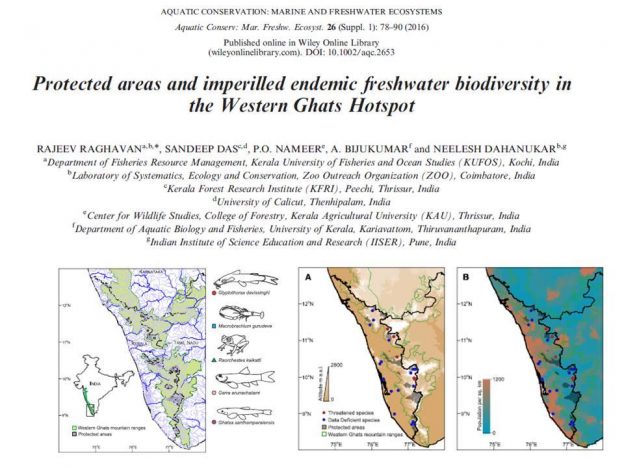New paper on the effectiveness of protected areas for freshwater dependent fauna in Western Ghats
More than half of Kerala’s endemic and threatened freshwater biodiversity occurs outside protected areas
More than half of Kerala’s endemic freshwater-dependent fauna (fish, shrimp, crab, amphibians and odonates) occur outside the current Protected Area network, revealed a study published last week in the international journal – Aquatic Conservation: Marine and Freshwater Ecosystems. The paper, a collaborative effort of the Kerala University of Fisheries and Ocean Studies (KUFOS), Kerala Forest Research Institute (KFRI), Kerala Agricultural University (KAU), University of Kerala and the Indian Institute of Science Education and Research (IISER, Pune) showed that odonates and freshwater shrimps have the fewest endemic species represented inside the Protected Areas of the State, and that the distribution ranges of all three species of odonates, and all but one of the shrimps occur completely outside the Protected Area network. Twelve endemic species (10 fish, one amphibian and one shrimp) which are not represented in any Protected Area are listed as threatened in the IUCN Red List, of which five are single-location species.
Although 62 species of endemic freshwater-dependent species of Kerala occur either wholly (25 species) or partially (37 species) inside the Protected Area network, they are rarely subject to species-specific management or monitoring plans. In addition, terrestrial Protected Areas also do not address the specific needs and functions of freshwater ecosystems such as connectivity. Protected status is also known to have minimal effect on native freshwater biodiversity, as it does not exclude threats such as invasion from invasive alien species, hydrological alterations and impoundments and infectious diseases. In areas with exceptional freshwater biodiversity and endemism like the Kerala region of Western Ghats, Protected areas need to be designed and managed exclusively for freshwater biodiversity so that they are more effective, and can prevent global extinctions.
The Hindu’s coverage on the paper http://www.thehindu.com/todays-paper/tp-national/freshwater-biodiversity-under-threat/article8813788.ece

